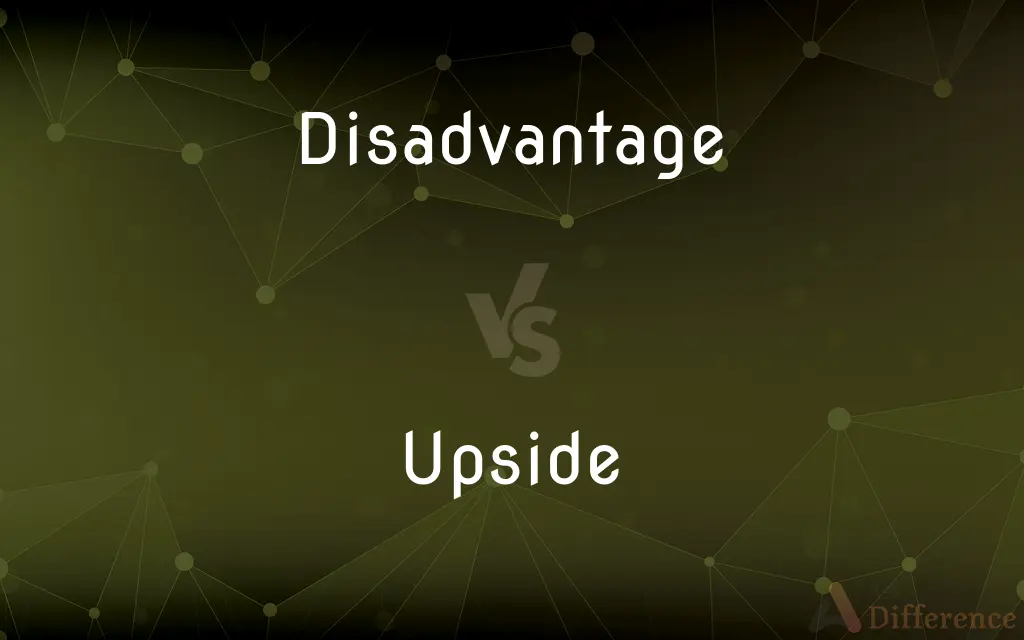Disadvantage vs. Upside — What's the Difference?
By Tayyaba Rehman — Published on October 28, 2023
A disadvantage is a condition or situation that causes detriment or hardship; an upside is a positive or advantageous aspect of something. They are antonyms, representing negative and positive elements respectively.

Difference Between Disadvantage and Upside
Table of Contents
ADVERTISEMENT
Key Differences
A disadvantage refers to any condition, circumstance, or characteristic that places someone or something in an unfavorable or inferior position. It represents the drawbacks or obstacles that may impede success or favorable outcomes. In contrast, an upside denotes the positive, beneficial aspects or potential gains of a situation or decision. It is the optimistic facet, emphasizing the rewards or advantages that can be obtained.
Disadvantage implies a state of loss, detriment, or hardship, highlighting the negative impacts or consequences that can arise. It often represents the risks, shortcomings, or limitations inherent to a situation or choice. Conversely, upside conveys a sense of gain, benefit, or advantage, focusing on the favorable outcomes, potential, or prospects that are present. It signifies the hopeful and constructive elements inherent to a circumstance or decision.
When evaluating options or opportunities, recognizing the disadvantages is crucial as it allows for an assessment of the potential difficulties, hindrances, or negative outcomes that may occur. It is integral to risk management and informed decision-making. On the other hand, identifying the upside is equally important as it provides a balanced view by spotlighting the possible gains, benefits, or positive outcomes, enabling optimistic yet realistic planning and forecasting.
The term disadvantage is often associated with challenges, impediments, and unfavorable conditions that may lead to failure, loss, or harm. It requires careful consideration and mitigation to navigate and overcome the adverse effects. In contrast, the term upside is correlated with opportunities, prospects, and favorable conditions that can lead to success, profit, or improvement. It demands recognition and utilization to capitalize on the available benefits and advantages.
Disadvantage and upside serve as opposing concepts, one highlighting the negative aspects and potential losses, the other emphasizing the positive facets and potential gains. Balancing the awareness and understanding of both disadvantage and upside is fundamental in decision-making processes, allowing for comprehensive evaluations and strategic planning to optimize outcomes.
ADVERTISEMENT
Comparison Chart
Definition
A condition causing detriment or hardship
A positive or advantageous aspect
Connotation
Negative, relates to drawbacks and impediments
Positive, relates to benefits and advantages
Usage
Represents risks and limitations
Highlights potential gains and favorable outcomes
Application
In scenarios depicting loss, harm, or failure
In scenarios depicting gain, improvement, or success
Importance
For assessing potential difficulties and risks
For recognizing possible benefits and positive impacts
Compare with Definitions
Disadvantage
Disadvantage represents a drawback or impediment in a situation or decision.
The lack of resources is a major disadvantage for small companies.
Upside
Upside denotes the potential gains or benefits of a decision or circumstance.
The upside of investing in technology is increased productivity and innovation.
Disadvantage
A disadvantage is a circumstance or feature that makes something less favorable.
The remote location of the house is a significant disadvantage for daily commuters.
Upside
Upside represents the optimistic or hopeful aspect of a situation or choice.
The upside of the relocation is the opportunity to explore new cultures and experiences.
Disadvantage
An unfavorable condition or position
Students who are at a disadvantage because they don't own computers.
Upside
Upside refers to the positive or advantageous part of a situation.
The upside of the rigorous training is enhanced endurance and skill.
Disadvantage
Something that places one in an unfavorable condition or position
A disadvantage to living there is that you'd have no access to public transportation.
Upside
Upside signifies the favorable outcomes or prospects in a given scenario.
The upside of the merger is access to a broader market and diversified products.
Disadvantage
Damage or loss, especially to reputation or finances; detriment
High gasoline prices have worked to the company's disadvantage.
Upside
The upper side or portion.
Disadvantage
To put at a disadvantage; hinder or harm.
Upside
An advantageous aspect
The upsides and downsides of home ownership.
Disadvantage
A weakness or undesirable characteristic; a con.
The disadvantage to owning a food processor is that you have to store it somewhere.
Upside
An upward tendency, as in business profitability or in the prices of a stock.
Disadvantage
A setback or handicap.
My height is a disadvantage for reaching high shelves.
Upside
On
"If you still didn't get it, well, sometimes you have to hit people upside the head ... to get their attention" (Howie Carr).
Disadvantage
Loss; detriment; hindrance.
Upside
The highest or uppermost side or portion of something.
Disadvantage
(transitive) To place at a disadvantage.
They fear it might disadvantage honest participants to allow automated entries.
Upside
A favourable aspect of something that also has an unfavourable aspect.
Disadvantage
Deprivation of advantage; unfavorable or prejudicial quality, condition, circumstance, or the like; that which hinders success, or causes loss or injury.
I was brought here under the disadvantage of being unknown by sight to any of you.
Abandoned by their great patron, the faction henceforward acted at disadvantage.
Upside
(finance) An upward tendency, especially in a financial market etc.
Disadvantage
Loss; detriment; hindrance; prejudice to interest, fame, credit, profit, or other good.
They would throw a construction on his conduct, to his disadvantage before the public.
Upside
(informal) On the top of.
Disadvantage
To injure the interest of; to be detrimental to.
Upside
The upper side; the part that is uppermost.
Disadvantage
The quality of having an inferior or less favorable position
Upside
The benefits; the positive features; - said of a situation or event that has both positive (good) and negative (bad) aspects.
These that have turned the world upside down are come hither also.
Disadvantage
Put at a disadvantage; hinder, harm;
This rule clearly disadvantages me
Upside
The highest or uppermost side of anything;
Put your books on top of the desk
Only the top side of the box was painted
Disadvantage
Disadvantage signifies a condition or state of hardship or detriment.
The team’s inexperience was a clear disadvantage in the competition.
Upside
Upside conveys the constructive or beneficial elements inherent to a circumstance or decision.
The upside of the challenging project is the acquisition of new knowledge and skills.
Disadvantage
Disadvantage denotes an unfavorable condition or characteristic that leads to a lesser position.
The absence of a clear strategy was a disadvantage for the political candidate.
Disadvantage
Disadvantage outlines the negative aspects or consequences inherent in a situation or choice.
The high cost of living is a principal disadvantage of residing in metropolitan areas.
Common Curiosities
Is recognizing "Disadvantage" important in decision-making?
Yes, recognizing disadvantages is crucial for informed decision-making and risk management.
Can "Disadvantage" refer to a characteristic?
Yes, it can refer to an unfavorable characteristic that places someone or something at a lesser position.
What does "Disadvantage" mean?
It means a condition or situation that causes detriment or places someone or something in an unfavorable position.
What does "Upside" imply?
It implies the positive or advantageous aspect of a situation or decision.
Can "Disadvantage" relate to circumstances?
Yes, it can refer to any unfavorable condition or circumstance that leads to detriment or hardship.
Can "Upside" represent potential gains?
Absolutely, it often denotes the potential benefits or gains of a situation or decision.
Why is identifying the "Upside" significant?
Identifying the upside provides a balanced view of situations, enabling optimistic and realistic planning.
Is "Upside" used in financial contexts?
Yes, in finance, "upside" often refers to the potential for stock prices or market values to rise.
Can a lack of resources be a "Disadvantage"?
Absolutely, a lack of resources is a significant disadvantage as it impedes growth and success.
Can "Disadvantage" lead to failure?
Yes, disadvantages, if not addressed or mitigated, can potentially lead to failure.
Is the "Upside" always evident?
Not always, sometimes the upside may not be immediately evident and may require careful analysis to identify.
Does "Upside" always guarantee success?
No, while it represents potential gains, realizing the upside depends on various factors and effective execution.
Can "Disadvantage" be overcome?
Yes, with strategic planning and effort, many disadvantages can be overcome or mitigated.
Can "Upside" be subjective?
Yes, what is considered an upside can vary depending on individual perspectives and values.
Is "Disadvantage" synonymous with weakness?
While related, they are not synonymous; a disadvantage is a condition or circumstance, while weakness is a lack of strength or ability.
Share Your Discovery

Previous Comparison
Home Country vs. Host Country
Next Comparison
Manifestation vs. VisualizationAuthor Spotlight
Written by
Tayyaba RehmanTayyaba Rehman is a distinguished writer, currently serving as a primary contributor to askdifference.com. As a researcher in semantics and etymology, Tayyaba's passion for the complexity of languages and their distinctions has found a perfect home on the platform. Tayyaba delves into the intricacies of language, distinguishing between commonly confused words and phrases, thereby providing clarity for readers worldwide.













































